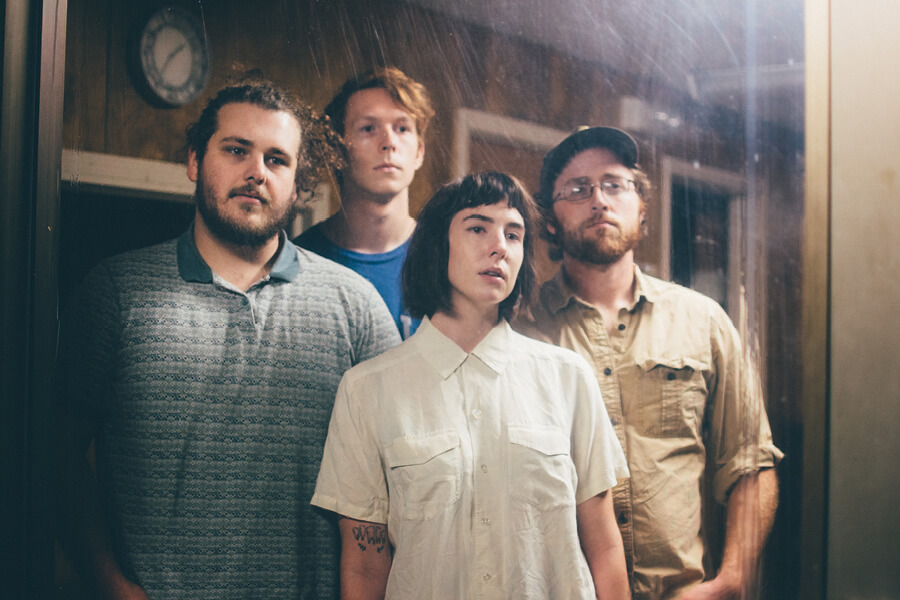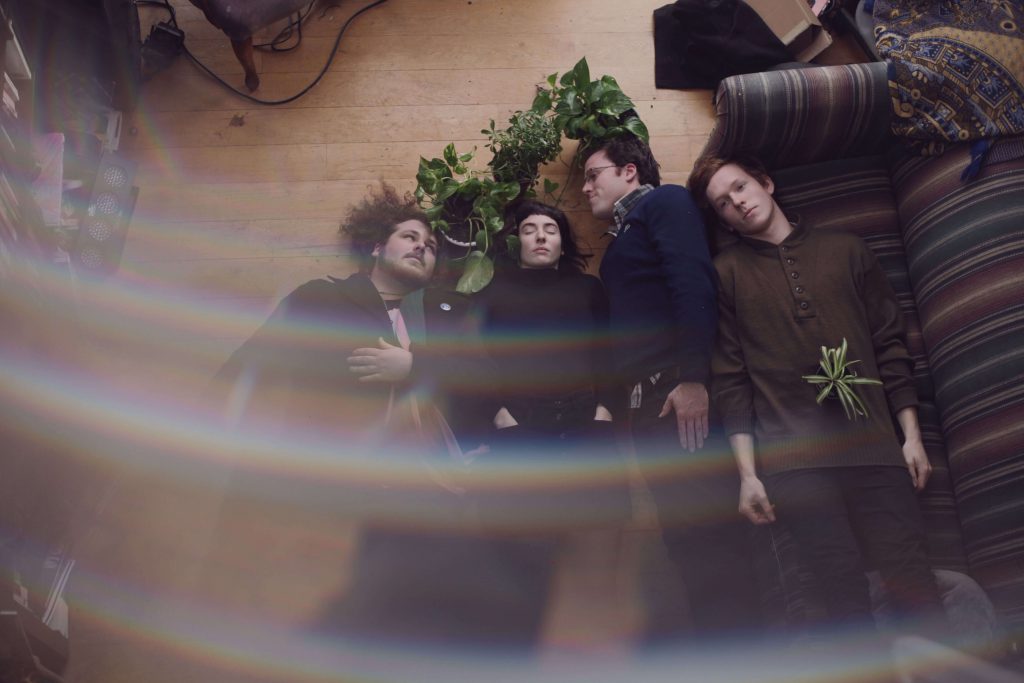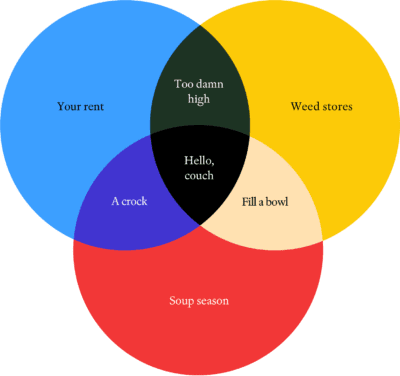Talking with: Mothers
Kristine Leschper knows how to make a lyric wail. Actually, sometimes the Georgia native’s voice rises from such guttural depths it seems like the lyric itself might be what’s steering the song. Leschper honed her brutally intimate songwriting on small local stages in Athens—a college town where every other waitress is a local musical hero—delivering mesmerizing acoustic sets as a hobby while she studied printmaking at the University of Georgia. Soon enough, her spidery, emotionally wrenching songs outgrew both the acoustic form and the borders of the town; Leschper’s solo project molted into the four-piece mathy and melodic band Mothers. She was first joined by Matthew Anderegg of Group Stretching on drums, Drew Kirby of New Wives on guitar, and Patrick Morales of the Viking Progress on bass. The Athens scene is something of a web, and Leschper also plays in other projects alongside other members of Mothers.
In December of 2014, though, it was Mothers who were offered the chance to record an album at the storied studio Chase Park Transduction. Still getting its sea legs as a collective, the band took the chance anyway, emerging a couple weeks later with the eight delicate, tenuous tracks that make up When You Walk A Long Distance You Are Tired. Not long after that, Mothers was scooped up by the New York-based independent label Grand Jury. This is not an album that sounds like the work of a rookie band, and Leschper especially writes with the devastating confidence of a seasoned artist. In many ways, she is. Now 24, she initially began writing songs in high school, and played solo for several years before fronting the band. In our conversation below, she talks about becoming a songwriter and what it’s like to share the personal in public, ugly crying onstage, and the extremes involved with being a creative person.


Photo courtesy of Kristin Karch
There seems to be a lot of focus right now on first person/personal essays and interior life, or the subjective versus the objective etc, sharing private details publicly vis a vis the internet or social media — how does it feel be something of a confessional songwriter stepping into that space, and what are your thoughts on that conversation?
A big part of what I do is try to talk about the human condition, because as people that’s everything. The way that you perceive and experience life is based on your mortality, and your relationships, and the way that you exist with other people. I think because that’s something that I want to talk about it’s easy for other people to relate to what I’m talking about. Even though it’s this thing that’s universal because as people we all experience it, I kind of try to talk about it in these more personal narratives, using more personal experiences that I’ve had in my life, that represent these bigger, broader ideas. I think it’s really powerful and really important to me that I’m living in a time where people are being so highly personal publicly. I think it’s really beautiful and important. Even though at times it can seem really self-righteous. I think that it’s really important and really special.
What prompted you to name the band Mothers?
There are a couple of reasons. First and foremost I love the way that the word sounds. As a person who is really interested in literature and the way that words sound coming off the tongue, and as a songwriter, it’s really important the way that words sound as you sing them. I also think that there’s this kind of tragic element to being a mother, it’s not something that I’ve experienced, it just seems like this kind of tragic thing where you create something, and then you have to let it go and put it out into the world and let it grow and do its thing. That’s kind of how it feels to me as a songwriter, it’s kind of this tragic thing where you spend so much time and energy and emotion and you put it into this thing that you make, and it’s very much a vessel that is you, that’s existing outside of yourself, that you have to let go of. And it’s beautiful and sad and overwhelming. So I just see a lot of ties between motherhood and being a songwriter.
When you were talking about the way words sound when you sing them, the tone of your voice is something that people bring up a lot. Is this something that you’re cultivating, or that happens naturally and you’re swept up in too?
It’s very cathartic. But that being said, it’s something that is growing and changing over time. I sing in a way that feels, it’s something that’s felt out for me. I sing in a way that feels right and feels right for the song that I’m singing. And so many of my solo songs were really really personal sad songs that were hard to sing. And there were a number of shows in town, where during the middle of the set I would end up open-mouth ugly crying, just because I was so emotional playing them! Like, ugly crying though. And that’s a big part of it, is being emotional and experiencing the way I felt while I wrote the song while I’m performing it, that kind of allows it to appropriate itself. But playing with a full band and needing to sing over a full band and write things and sing in a way that’s appropriate for the music has changed and evolved over time, and I’ve gotten a lot more confident in that growth. It’s something that I’m aware of but that’s also very natural.
I wanted to ask you about “Lockjaw,” which is one of my favorites. Especially the image of a napkin in the rain! Every time I hear it, it’s so evocative. Because it’s so useless and disintegrating and pathetic. Because I’ve felt like that, I understand that. Can you talk about writing that one?
That one was very much about being in a relationship that was toxic and letting go of it, and being stronger than it. It was also a period of time in which I was wanting to write songs that were more specifically about the imagery and wanting to paint this image with the words that I chose. Which isn’t necessarily — I kind of go through phases with how I write, sometimes it’s based much more on imagery and things that are brought to mind visually when you listen to a song, and sometimes it’s much more about the textures and the tone of it. It was a song about needing to be powerful in a time when I didn’t feel powerful, and being stronger than I felt like I was at the time.
[sc:ithurts ]
On the flipside of that my other favorite is “It Hurts Until It Doesn’t,” which I think is the first one I heard — No heard “No Crying In Baseball” first — but this was the one where I was immediately like ‘Whoa this band is really special to me.’ You’re talking about feeling alive or dead or crushed by your own ego, but a lot of your songwriting is the kind of things that people aren’t willing to see in themselves, and there’s a lot of introspection. Is it hard for you when you’re searching back through your relationships and you’re finding the ways that you fucked up instead of only pushing blame outward? I think that takes a lot of self-awareness and is really rare to hear. What is the process for you when you’re sifting through stuff?
I think it’s been really enlightening to call myself out in that way. It feels good to do, which is strange. I think that as a creative person — a lot of creative people go through this thing where you have two ends of the spectrum, and it’s really hard for you to exist in a nice happy medium. It’s kind of like the same idea as manic depressive disorder. You have this super huge ego on one side and then you have crippling doubt and self-loathing on the other side. You’re never just in between, you’re always pushed to one side. And finding a way to deal with that I think is one of the most difficult things about being a maker of things. And so that’s what a lot of my songs are about. Because I do experience those really extreme fluctuations of like, extreme confidence and big headedness and ego, and crippling, absolute doubt and despair, and not feeling worth anything. And so yeah, that’s a huge thing that, for that song, is aiming to talk about.
[sc:copper ]
It really succeeds. I also wanted to ask you about the album title, because it’s so simple and there’s a way that you tie together physical and emotional exhaustion that’s really interesting.
So I really love sentences or phrases or collections of words that are so utterly simple, like obnoxiously simple and meaningless, that you have to put a different meaning onto them to make sense of them. That sentence for example: When You Walk A Long Distance You Are Tired. Obviously, clearly that is the case, so what I like about it, is because it’s so simple the listener says clearly there has to be something more here, this person is trying to say something else. So it allows the reader or the listener to apply their own context. It leaves it open ended so the person reading the sentence decides what it means.
I noticed that you use all lowercase in your title and naming practices. Is that purely aesthetic for you?
It’s aesthetic, it’s also this idea of all the letters in the word having the same value. It’s kind of weird to me that grammatically it’s normal and preferred to use capital letters. I don’t know, it’s just kind of strange, I just prefer for everything to have the same value. When I write things out in my notebook, I write in all caps, because that’s just what feels comfortable for me. And there isn’t any distinguishing between different words that are more important or less important. It’s kind of an equalizer for me.
When You Walk A Long Distance You Are Tired is out 2/26 via Grand Jury/Wichita Recordings. Pre-order it here.
You might also like 





















